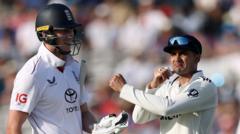What Caused Amanda Anisimova to Break Down in Tears After the Wimbledon Final?

Amanda Anisimova's Historic Wimbledon Final: A Heartbreaking Journey
The world of tennis is filled with thrilling victories and crushing defeats, often encapsulated in moments that define a player's career. One such moment unfolded during the Wimbledon final when Amanda Anisimova faced off against Iga Swiatek. In a match that will be remembered for its unprecedented scoreline, Anisimova experienced a defeat that, despite its brutality, showcased her character and resilience. This article delves into the details of this remarkable match, the emotional aftermath, and what it signifies for Anisimova's career moving forward.
The Match: A Double Bagel in History
On that fateful Saturday, the atmosphere at Centre Court was electric, with spectators eager to witness a competitive showdown. However, what followed turned out to be a historic event in tennis history. Anisimova, the 13th seed, faced a devastating loss, falling to Swiatek with a score of 6-0, 6-0, in under an hour. This loss marked only the second time in the Open Era that a women's singles final ended with such a score, the first being in 1911 when Dorothea Lambert Chambers defeated Dora Boothby.
The term "double bagel" refers to a match score of 6-0, 6-0, which signifies that one player failed to win a single game. For Anisimova, this defeat was not just about the scoreline but the emotional weight of falling short on one of the biggest stages in tennis. Despite her talent and potential, she found herself overwhelmed by Swiatek's skill and composure.
The Historical Context
Wimbledon has a storied history, and matches that conclude with a double bagel are rare. Iga Swiatek's triumph places her alongside Steffi Graf, who achieved the same feat at the 1988 French Open. This statistic highlights the significance of Swiatek's achievement, but it also emphasizes the magnitude of Anisimova's challenge.
A Rollercoaster of Emotions
In the aftermath of the match, Amanda Anisimova's emotions were palpable. During her on-court interview, she broke down in tears, speaking candidly about her experience. It was a moment that transcended the loss; it displayed her vulnerability and humanity. Despite the overwhelming disappointment, Anisimova took a moment to express gratitude to her opponent, Swiatek, acknowledging her talent and the inspiration she provides.
Words of Gratitude and Reflection
In her emotional address, Anisimova thanked her supporters, family, and team, emphasizing the importance of their encouragement throughout her journey. Here are some key excerpts from her heartfelt speech:
- “Thank you Iga, you’re such an incredible player and it obviously showed today.”
- “Thank you to everyone that’s supported me since my first round match here. You guys have carried me through this entire Championships.”
- “I wouldn’t be standing here if you guys didn’t fly in and support me throughout the tournament.”
- “My mum’s put in more work than I have honestly.”
- “I’ll keep putting in the work. I keep believing in myself and I hope to be back here one day.”
These statements reflect not only her disappointment but also her resilience and commitment to growth. While the defeat was historic, it did not define her as a player. Instead, it became a stepping stone for future endeavors.
The Role of Support Systems
In the world of competitive sports, the importance of a support system cannot be overstated. Anisimova’s speech highlighted the significant role her family, particularly her mother, played in her journey. Athletes often face immense pressure, and having a strong support network can make all the difference. Here are a few key points regarding the impact of support systems in sports:
- Emotional Stability: Support from family and friends provides emotional grounding, helping athletes navigate the highs and lows of competition.
- Motivation: Support systems often serve as a source of motivation, encouraging athletes to push through challenging times and strive for improvement.
- Accountability: Having a team or family present helps athletes stay accountable to their training and performance goals.
- Shared Experiences: Celebrating victories together and coping with defeats can create lasting bonds that enhance personal well-being.
For Anisimova, her family’s presence during the tournament was a crucial factor in her performance, despite the outcome of the final match.
The Road Ahead for Amanda Anisimova
After a match that will be etched in her memory, the question arises: What’s next for Amanda Anisimova? At just 23 years old, she has a long career ahead of her. While the Wimbledon final was a low point, it also serves as a learning experience. Here are several considerations for her future:
1. Emphasizing Mental Resilience
One of the most critical aspects of professional sports is mental resilience. Anisimova must focus on building her mental strength to handle pressure situations better. This could involve working with sports psychologists or engaging in mindfulness practices to enhance her focus and composure during matches.
2. Analyzing Performance
Post-match analysis is essential for growth. Anisimova can benefit from reviewing her gameplay in the final match to identify areas for improvement. Whether it's refining her serve or enhancing her defensive strategies, understanding what went wrong will be crucial for her next steps.
3. Setting Short-term and Long-term Goals
Goal setting is vital for any athlete’s progression. Anisimova may want to establish both short-term goals, such as improving her ranking or winning a particular tournament, and long-term goals, like competing for Grand Slam titles. This approach can provide her with direction and motivation moving forward.
4. Continuing to Learn from Other Players
Learning from other top players, including Swiatek, can be instrumental in Anisimova’s development. Observing their techniques, strategies, and mental approaches can provide valuable insights that she can incorporate into her own game.
5. Maintaining Physical Fitness
Physical conditioning is a cornerstone of athletic performance. Anisimova should continue to focus on her fitness regimen to ensure she can withstand the demands of high-level competition. This includes strength training, cardiovascular conditioning, and flexibility exercises.
A Final Thought
While the Wimbledon final may have been a painful chapter in Amanda Anisimova's career, it is far from the end of her story. Her ability to express gratitude and resilience in the face of adversity showcases her maturity as an athlete. As she navigates the complexities of professional tennis, one thing is certain: she has the potential to rise from this defeat and emerge stronger than ever.
The world of tennis is watching, and Anisimova's journey is only just beginning. How will she transform this experience into the fuel that drives her future success? The answer lies in her dedication, growth, and unwavering belief in herself.
Frequently Asked Questions
What does a double bagel mean in tennis?
A double bagel in tennis refers to a match score of 6-0, 6-0, indicating that one player failed to win a single game during the match.
How can athletes cope with defeat?
Athletes can cope with defeat by focusing on mental resilience, seeking support from family and coaches, analyzing their performance, and setting new goals for improvement.
What role does family play in an athlete's success?
Family provides emotional support, motivation, accountability, and a shared experience, which can significantly impact an athlete's performance and mental well-being.
Amanda Anisimova's journey is a testament to the highs and lows of competitive sports. As she reflects on this experience, one must wonder: how will she channel her emotions into future success? #Tennis #Wimbledon #AmandaAnisimova
Published: 2025-07-12 17:30:45 | Category: Sport



